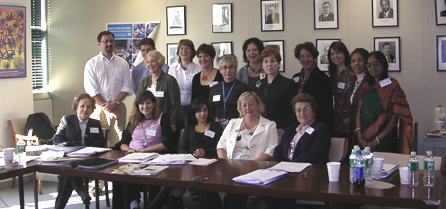 Reimagining
Women’s Security in Societies in Transition Reimagining
Women’s Security in Societies in Transition
Start
Date: 2004 |
Completion
Date: 2006 |
Project Summary: This ESRC funded project will contribute
to an understanding of the role and experiences of women in contemporary
post-conflict societies by means of an examination of the gendered meanings
of security.
Funders:
This project is funded under the ESRC New
Security Challenges Programme (Ref no RES-223-25-0066)
Project Partners: This
project was carried out through a unique research partnership with
Queen’s
University Belfast, University of Ulster, Democratic Dialogue, and with research
associates at the Centre for the Study of Violence and Reconciliation in South
Africa and the Lebanese American University in Beirut.
.
| Professor
Paddy Hillyard |
Queen's University Belfast |
| Professor
Monica McWilliams |
NI Human Rights Commission |
| Professor
Gillian Robinson |
INCORE, University
of Ulster |
| Dr. Margaret
Ward |
Womens Resource and Development Agency |
| Brandon Hamber |
INCORE, University of Ulster |
| David Russell |
NICIE and Associate, Queen's University Belfast |

Launch:
The project was officially launched in New York 12-13 October
2006 at the United
Nations University


Publications:
Research
Briefing Paper June 2004 (pdf)
Key
Findings October
2006
Hamber,B,
Hillyard, P, Maguire, A, McWilliams, M, Robinson, G, Russell, D
and Ward, M, 'Discourses in Transition: Re-imagining Women's Security', International
Relations, Vol 20 (4): 487-502, 2006
Hillyard,
P, McWilliams, M and Ward, M (2006) Re-imagining
Women's Security: A Comparative Study of South Africa, Northern
Ireland and Lebanon. Northern Ireland Gender Audit.
Palmary, I (2006) Re-imagining women's security: A Comparative study
of South Africa, Northern Ireland and Lebanon. South African Gender
Audit.
Working Papers October 2006 (Please contact authors directly for papers)
- Issues
in comparative methodology in researching women’s
security
Prof Gillian Robinson
- Need peace agreements recognise women?
Dr David Russell
- Still too many men in the room': an examination of the political
and public representation of women in transitional societies
Dr
Margaret Ward
- Women's
Empowerment, Security and Peace Agreements”
Dr Mona Khalaf
- Rethinking Human Rights, Human Security and Violence Against Women
Prof. Monica McWilliams
- We must be very careful how we emancipate our women: shifting masculinities
in post-conflict societies.
Dr. Brandon Hamber
- Law, Constitutions and the Protection of Women's Security
Amy Maguire
- Gender, Security and Policing in Transition: Some reflections on post-Agreement
developments.
Prof. Paddy Hillyard and Amy Maguire

Project
Overview: June 2004. Work on this project began
in January 2004.
Introduction:
This project will
contribute to an understanding of the role and experiences of women
in contemporary post-conflict societies by means of an examination
of the gendered meanings of security. The
study will be undertaken through a research partnership between the
University of Ulster and Democratic Dialogue and with research associates
in South Africa and Lebanon.
Data Collection Techniques:
In the three societies, (i.e. Northern Ireland, South Africa and Lebanon)
we will:
- Conduct ten interviews in each country with a selected number
of key people in politics and those involved in peace-building organisations
and institutions.
- Carry out at
least nine focus groups to explore issues around security and empowerment
with the following groups of people –
- 1: Women in economic reconstruction
- 2: Women in NGOs
- 3: Female Party activists
- 4: Male Party
activists
- 5: Women in public life
- 6: Men in public life
- 7: Male Ex-combatants
- 8: Female Ex-combatants
- 9: Victims
- Produce
a gendered audit of post-conflict development focusing
on the outworking of peace agreements in terms of mechanisms,
structures and relationship building.
In each of the
components the research will be highly focused in terms of the people
selected, the questions asked and the issues explored. The gendered
terrain is too large for one small project. The aim therefore is
to emphasise the comparative element of the research and to draw
out the similarities and the differences in the three countries on
key selected areas and issues. The key issues can be conceptualised
in the form of a matrix with the dimensions of the outworking of
peace agreements running along the top of the matrix and four selected
areas in which they have impacted upon the security of women running
down the matrix below.
|
Dimensions
of the Outworking of Peace Agreements |
|
Structures |
Mechanisms |
Outcomes |
Areas of Impact |
|
|
|
Socio-economic |
|
|
|
Personal security |
|
|
|
Civil
participation |
|
|
|
Political participation |
|
|
|
The research will
explore for the four selected substantive areas, the extent to which
the outworking of peace agreements has produced new structures, such
as new institutions (e.g. gender commission;
equality laws), new mechanisms (e.g. proportional representation, quotas),
as well as changes in relationships (e.g. new networks, lobbying groups,
NGOs, etc.). It will then assess the impact and outcome of these
changes on women’s security and empowerment. For example, has
the use of quotas (mechanism) enhanced women’s empowerment in
terms of civil and political participation? Has a Domestic Violence
Act (structure) increased levels of personal security for women? Has
lobbying increased women’s socio-economic power?
Based on an initial
audit of mechanisms, structures and relationships, an interview protocol
will be designed. This will be piloted in two focus groups in Northern
Ireland. A finalised protocol to
guide the focus groups and interviews, broadly similar in each context,
will then be developed.
Dissemination
A report on gendered
notions of security, comparative lessons, on-going problems and best
practice regarding the integration of women in public life in the three
case-studies will be produced and seminars in all three countries will
disseminate the findings at local level. In addition
an international conference will be convened in Northern Ireland
to ensure dissemination across the broader international community.

|

